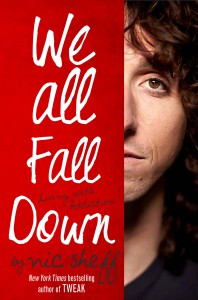Join Together sits down with Nic Sheff, author of the new memoir We All Fall Down, to discuss his personal journey of recovery from substance abuse. Nic’s 2008 bestselling memoir, Tweak, chronicles his battle with crystal meth and heroin. In 2008, while on a highly publicized book tour with his journalist father, David Sheff, author of the bestselling Beautiful Boy: A Father’s Journey Through His Son’s Addiction, Nic relapsed again. We All Fall Down explores Nic’s recent relapses and presents a young man struggling to find his own personal path to sobriety.
Join Together: Please provide one piece of advice, or insight, to share with families who may be sending their kids into treatment for the first time.
Nic: I guess all I’d say is that, as hard as it is, no matter what, it is worth it—it is going to help. For me, every time I went into treatment I learned a little bit more and progressed a little bit further. It was never a waste—even if I didn’t always stay sober afterwards. There are so many factors that have had to come together in order for me to finally get sober and, more importantly, to love my life and want to stay sober. Each time I went to rehab I got stronger and more and more confident. It always helped—always. In fact, just in general, I believe in getting as much help as possible—especially after the thirty days or whatever is finished. Outpatient, group therapy, individual therapy, meds—all those things have been truly life saving for me. So, yeah, I guess I’d also say that, as much as treatment does work, it is only the beginning. It’s all about “after care.”
Join Together: What do you wish your parents would or would not have done, when they first discovered that you were using and began to understand that you needed help?
Nic: This is definitely a hard question because obviously not every kid experimenting with smoking pot, drinking or whatever is going to grow up to be an addict. But there was something different about the way I went about getting high in high school that set me apart from other kids. I really needed it, you know? There was a desperation and a compulsion in me that I guess maybe my parents might’ve been able to recognize sooner. All I can really say is that, when I have my own kids, if I were to ever see that they were starting to use drugs in a kind of self-medicating way, I would immediately give them an ultimatum and stick with it. I would basically say they either had to get into treatment or they were going to be completely on their own. I know that’s hard and scary for a parent to do, but if my parents hadn’t finally gotten to that point, I am a hundred percent sure I’d be dead or in jail by now. In hindsight, I only wish they’d drawn that line sooner for me. I gained absolutely nothing being out there using. Oh, and if my child was under eighteen, I’d force them into a program whether they hated me for it or not.
Join Together: Looking back – do you recognize any warning signs that may have drawn you to substances at such an early age?
Nic: Well, I’d say I have always been intensely sensitive and intensely uncomfortable in my own skin. I hated living as myself. And, as far as I can remember, that was actually pretty conscious. That is, I think I was aware of it. I think I knew that I hated myself. So it makes perfect sense to me that I would’ve sought relief in drugs and alcohol. I mean, that’s exactly what those substances gave to me, a way of not having to be myself anymore. I definitely get why I was drawn to substances, they seemed like the answer to all my problems. And that’s really what differentiates addicts from normal people—addicts use as a way to try and fill that empty space inside. Drugs seem like the thing we’ve always been missing. So, yeah, for me, I approached using drugs completely differently than a normal person right from the beginning.
To find out what else Nic Sheff shared with Join Together, stay tuned for Part 2 of his interview on Friday, April 15.
Visit Amazon.com to read an excerpt and purchase a copy of We All Fall Down: Living with Addiction.
Published
April 2011


